

PinkerBooklet. Can Libraries Be Fun? Appendix C Reference Syllabi 11 24 14. HIP_tables.pdf. A Eulogy for the Long, Intimate Email. When I started college in 1997, I got my first email account, as did most of my peers.
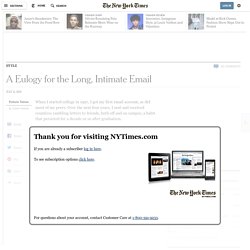
Over the next four years, I sent and received countless rambling letters to friends, both off and on campus, a habit that persisted for a decade or so after graduation. Now I can’t remember the last time I wrote or read an email of more than four or five meaty, intimate paragraphs. I can chalk up some of my letter-writing decline to my age and profession: I have a (somewhat) smaller appetite these days for Knausgaardian navel-gazing, and expend more energy writing for work. Personal Learning Environments, social media, and self-regulated learning: A natural formula for connecting formal and informal learning. Abstract A Personal Learning Environment or PLE is a potentially promising pedagogical approach for both integrating formal and informal learning using social media and supporting student self-regulated learning in higher education contexts.
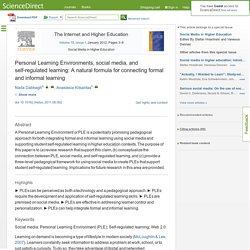
The purpose of this paper is to (a) review research that support this claim, (b) conceptualize the connection between PLE, social media, and self-regulated learning, and (c) provide a three-level pedagogical framework for using social media to create PLEs that support student self-regulated learning. Implications for future research in this area are provided. Highlights. Crowd-sourcingtheoreticalprogression.pdf. Outline - Research @ Reynolds Library - Research Guides at J. Sargeant Reynolds Community College. Teaches are always on the lookout for ways to foster great questioning skills.
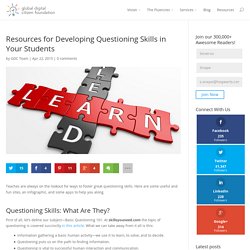
Here are some useful and fun sites, an infographic, and some apps to help you along. Questioning Skills: What Are They? First of all, let’s define our subject—Basic Questioning 101. At skillsyouneed.com the topic of questioning is covered succinctly in this article. What we can take away from it all is this: Information gathering a basic human activity—we use it to learn, to solve, and to decide.Questioning puts us on the path to finding information.Questioning is vital to successful human interaction and communication.We use questioning to obtain information, control dialogues, express interest, clarify things, explore others’ personalities, and test knowledge and insights.
Another cool website with resources dedicated to teaching students to ask their own questions can be found here at right question.org. Then there’s this infographic from learningcommons.ubc.ca: image source: learningcommons.ubc.ca What If? Edge.org. Children watch their parents play with shiny technical objects all day.
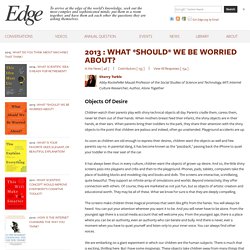
Parents cradle them, caress them, never let them out of their hands. When mothers breast feed their infants, the shiny objects are in their hands, at their ears. When parents bring their toddlers to the park, they share their attention with the shiny objects to the point that children are jealous and indeed, often go unattended. Playground accidents are up. As soon as children are old enough to express their desires, children want the objects as well and few parents say no. It has always been thus: in every culture, children want the objects of grown up desire.
The screens make children three magical promises that seem like gifts from the fairies. We are embarking on a giant experiment in which our children are the human subjects. Final.pdf. My presentation for Scholarship in the Public Eye: The Case for Social Media – Confessions of a Science Librarian. As I mentioned in yesterday’s post, I did a short presentation on Scholarship in the Public Eye: The Case for Social Media as part of a panel for a York Faculty of Graduate Studies Scholarly Communications Series.
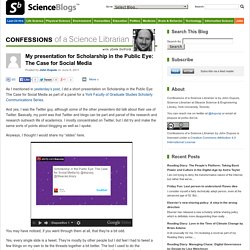
And yes, I was the Twitter guy, although some of the other presenters did talk about their use of Twitter. Basically, my point was that Twitter and blogs can be part and parcel of the research and research outreach life of academics. I mostly concentrated on Twitter, but I did try and make the same sorts of points about blogging as well as I spoke. Anyways, I thought I would share my “slides” here. You may have noticed, if you went through them at all, that they’re a bit odd. Yes, every single slide is a tweet.
You can see my Storify story here and as a slide show here. Theres-a-lot-to-know-so3-07022015-.jpg (JPEG Image, 331 × 496 pixels)